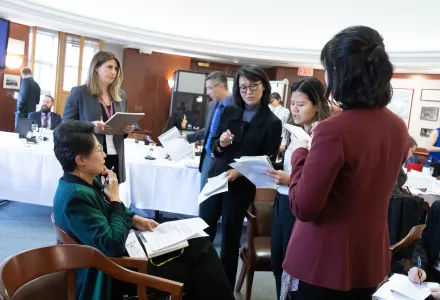
In April, the China Institute for International Strategic Studies (CIISS) joined the Belfer Center’s Cyber Project in hosting their second working group meeting, a Track II dialogue to facilitate discussions between the U.S. and China on the risks of cyber conflict. The meeting, which included representatives from both countries’ tech sectors, explored existing and new tools for mitigating these risks and looking into possible areas for collaboration.
“The U.S. and China have a tremendous amount of power in cyber, and without appropriate dialogue there is a heightened chance for inadvertent conflict,” said Belfer Center Director Ash Carter.
Eric Rosenbach, Co-Director of the Belfer Center, said, “We need to stop talking past each other, have frank and constructive conversations, and start working on mutual interests. We’re uniquely placed at the Belfer Center to convene a diverse group of stakeholders on both sides to tackle one of the most difficult international issues today.”
The working group in Cambridge brought together 20 former government and military officials and tech, business, and academic professionals to discuss current issues in the bilateral cyber relationship. Both sides worked through a fictitious cyber scenario to discuss what their respective governments and companies would do in the face of a third party cyber attack on critical infrastructure. The working group also discussed AI, IP theft, supply chain security and Huawei, arms control frameworks, and controlling the spread of malware over the dark web. The next working group will take place in August in Shanghai, followed by a November working group in Cambridge.
Ahead of the August meeting, the team, led by the project’s Research Director Julia Voo, will begin designing a joint framework for stability between the U.S. and China in cyberspace, looking specifically at controlling the spread of malware as an area of shared concern and possible collaboration.
This Track II dialogue was supported by a grant from the Harvard Global Institute (HGI) and the Harvard President’s Office.
"U.S.-China Cybersecurity Group Explores Mutual Interests, Goals." Belfer Center Newsletter. Belfer Center for Science and International Affairs, Harvard Kennedy School (Summer 2019).


